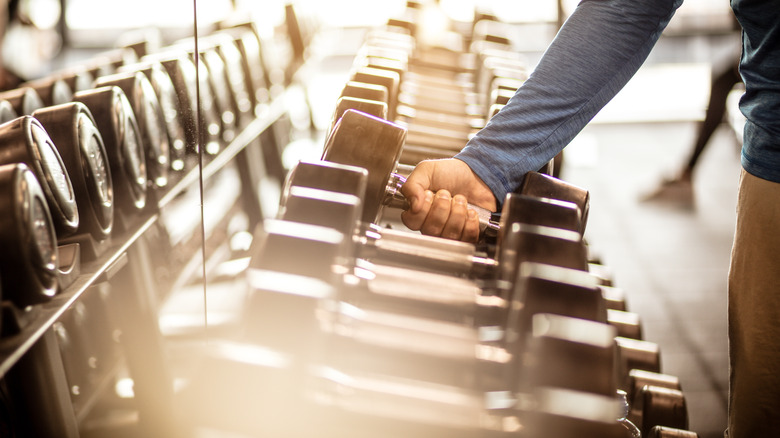Here's How To Know When To Switch To Heavier Weights
You've been hitting the gym hard for a while and you've got the results to prove it. Maybe it takes longer for your heart rate to spike or you find yourself pushing a little bit further in your runs. When it comes to cardio, it's easy to tell when you've gained enough ground to level up your workout. But things aren't always so clear in the weight room.
Bulking up your rep weight too early is a bad idea, but putting it off can also mean your gains plateau. Of course, they're bound to at some point. As Caroline Juster, elite trainer at Chicago's Fitness Formula Clubs Union Square Station told Self, everyone has a unique upper limit on how much strength they can add. But upping your weight at the right time can help you maintain a steady build toward your goals, whether they're hitting that upper limit or just reaching a certain level of tone.
Self went on to explain that different areas of the body may need weight level changes at different times. Lower body muscles tend to increase before upper body muscles. And those muscle groups worked by multi-joint exercises like bench presses and squats transition before those worked with single-joint exercises like tricep extensions and reverse flies. No matter when the weight needs to change, however, there are certain signs that hold true across all muscle groups.
The signs
If you want to know whether or not to add more weight, look at how easy or hard your current reps are. And there are two ways to do this. Bodybuilding, a website dedicated to strength training and body sculpting, suggests a rule they call "2 for 2". This is shorthand for the idea that it is time to use heavier weights if you can add two reps to your set, without struggling, for two consecutive workouts. As Rob Sulaver, CEO of Bandana Training, told Greatist, "If you're performing the last couple reps easily at normal speed, you could probably go heavier."
Sulaver's method is a little different, more like a three-point checklist. At the top is the speed of your reps. Your last few reps should require a little struggle as you work to keep your form. If you're flying through them, as he told Greatist, then it's time to reach for heavier weights. This is why form is second on Sulaver's list. If you can't maintain proper form, then you might just be moving too fast, But if you can, then you can go ahead and trade up. The final point on the list is how you feel after your workout. If you're not sweating and huffing a little bit, your workout might just be too easy. And when it comes to strength training that means it's time to go for bigger weights.


